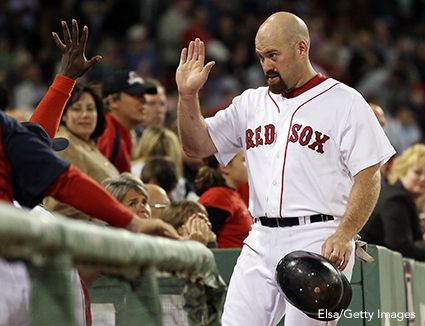To many, the term "Jewish sports legends" might make them think of the scene from "Airplane," in which this topic is considered light reading. But to Chicago real estate executive and lifelong baseball fan Jeff Aeder, it's no laughing matter, and earlier this year, he launched the online Jewish Baseball Museum.
The website is filled with interviews, statistics, memorabilia, historical anecdotes and more, chronicling Jewish contributions to the game.

"It was a love for baseball, love for history and pride in my Jewish heritage," Aeder said. "A combination of all three of those led me to get interested in the history of Jews in baseball. I learned more about it, and I loved the stories and the characters, so I wanted to put something together to share with others."
Even casual baseball fans could probably drop names like Hank Greenberg and Sandy Koufax if asked about big-time Jewish ballplayers. But what about eight-time All-Star and 1948 AL MVP Lou Boudreau, 1953 AL MVP Al Rosen or 1980 AL Cy Young winner Steve Stone? Then there are more recent stars like Kevin Youkilis, Shawn Green, Ryan Braun, Ian Kinsler, Kevin Pillar and Joc Pederson. All have their career achievements have been chronicled on Aeder's site.
Overall, Jews account for three of the 217 players in the National Baseball Hall of Fame (Greenberg, Koufax, Boudreau) and a combined six MVP awards in the MLB's live-ball era – not too shabby for a group that is estimated to account for 0.17 percent of the world's population.
Aeder, who co-founded JDI Realty in 1988, is known for pursuing passion projects. He created Wolcott School, the first college-prep high school in Chicago dedicated to students with learning disabilities, and Milt's, a kosher barbecue restaurant that donates its profits to a charity.

When he had the idea to create the Jewish Baseball Museum, his first thought was to house it in a building rather than developing an online collection. That's when he said his wife, Jennifer, (with whom he shared the honor of being 2013 Chicagoans of the year) gave him a reality check.
"She said to me, 'What happens if you're the only one who cares about this,' and I said, 'I never thought about that, maybe I am, so let me do an online museum first to see if anyone else is interested," Aeder recalled. "I've found that each week we have a new article that comes out -- we've done a lot of interviews with old players -- and each week I get a ton of comments from people. It's never going to compete with the Shedd Aquarium here in Chicago as to where the most interest is, but it's still a lot of fun."
The website still says that a physical location for the Jewish Baseball Museum is coming in 2017, but Aeder needs more time to determine if that will make sense.
"I would say that the interest has probably been in line with reasonable expectations, and every day we get another half-dozen people sign up for the site … we are seeing that a lot of people are reading the weekly emails and commenting and enjoying it, so that's great," Aeder said. "It's not going to change the world, but it's just a lot of fun for us baseball fanatics and history buffs who love the history of Jews in baseball."

Some Jewish legends have cemented their legacies off the diamond, with Aeder spotlighting early 1900s Pittsburgh Pirates' owner Barney Dreyfuss – the man behind the creation of the World Series – and Bud Selig, who served 23 years as commissioner after being owner of the Brewers.
"It's not just as a player; it's as an owner and a manager and as an umpire and a sports columnist, so in all aspects of the game, there's just been a huge amount of Jews," Aeder said when asked why he felt they were more prominent in baseball than in other major American sports. "Initially, to Jewish families, baseball made them feel more American, and it was their way of assimilating – it was just the American game. Now, for a lot of us, it still makes us feel more Jewish, which is, when you see a player and root for player – Alex Bregman was just brought up, and when I saw him getting drafted No. 2 [in 2015] I wound up talking to his mother about how exciting it was, so I was just thrilled to see that – it’s unreal. But why baseball and not other sports? I just think it's the All-American game."
What truly makes Aeder's website special is its focus on the stories that can't possibly be captured in a box score or Hall of Fame plaque. These range from tales of vicious prejudice to World War II heroics to controversial holiday rituals (most famously Koufax's declining to pitch Game 1 of the 1965 World Series because it was on Yom Kippur) and everything in between.
"The history of baseball is very much the history of the United States, and I find it fascinating, the fact that early players like the Five Cohens changed their last names to disguise that they were Jewish," Aeder said of a group from the early-1900s. "Today, there are people like Ian Kinsler … who is proud of having some Jewish heritage, and the same thing goes for Ryan Braun and many other players nowadays.
"I think that's the great thing about this country. We're accepting of all sorts of people and we can be proud of who we are and our heritage, and that's shown in these stories, so I think that's pretty cool."





